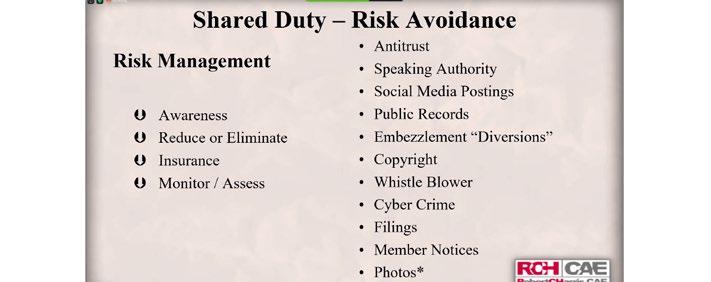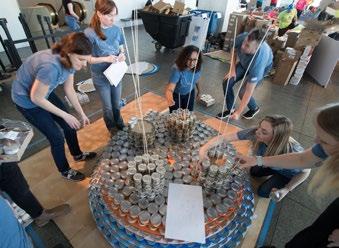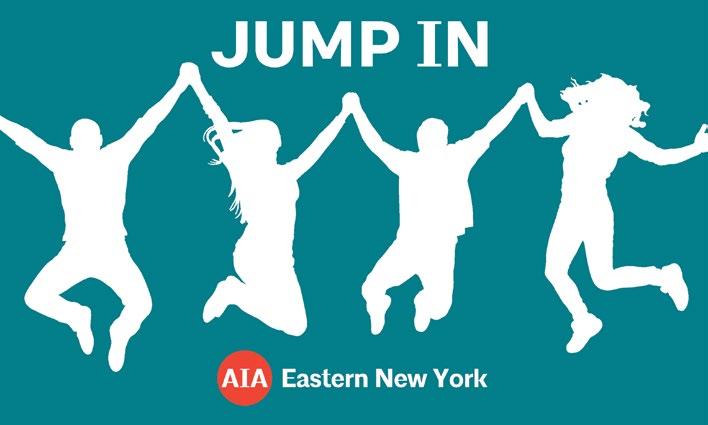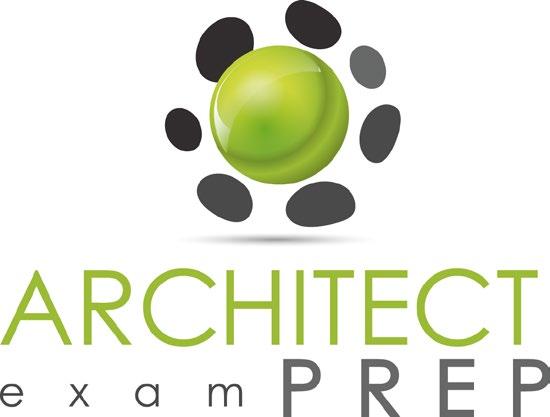
7 minute read
Embracing Our Collective Community
ARCHI text Embracing Our Collective Community
SWBR & 3t’s Quest to be One, While Positively Impacting Many
Scott Townsend, AIA is a Principal of 3t, an SWBR Company. Previously he founded and was the Design Partner of 3tarchitects, a Troy, NY firm focusing on creating positive community impacts by design. 3t was recently acquired and has merged with SWBR, a firm that was similarly focused with a deep talent pool and a reservoir of goodwill in the community, with their clients and amongst themselves. Together, they will go further. Throughout Scott’s career, he has created and led firms acting on his belief that healthy places emerge from the heart and are sustained from within by its occupants, irrespective of outside policy. Scott’s approach is to engage with folks in their own communities, encouraging designs to emerge through collaborative efforts. Not designing for, from afar; designing with, from within. Beyond creating several social cause focused organizations, several of his firm’s projects began with Scott, prior to finding a funding source or any willing partners. He holds that addressing a community’s needs through collaborative problem solving will always find partners, and eventually funding. Sheridan Hollow Charette Presentation
by Scott Townsend, AIA, 2021 AIANYS Director
The Offer
SWBR—specifically, Dave Beinetti, this year’s AIANYS’s Frederic Schwartz Community Development Award winner - approached my partner, Geoff MacDonald, and I in the summer of 2019 and broached the intriguing idea of our firms joining forces via an acquisition of our firm, 3tarchitects. Geoff and I were flattered. SWBR is a rock-solid firm with a stellar reputation and portfolio of work. Yet 3t had just come off its best financial year to date, and was winning awards and garnering attention. 3t’s trajectory was on the upswing.
Why would we sell since, on paper at least, we did not need them?
The question “why?” was at the root of most discussions and our thoughts over the months ahead. The answer of why to merge probably varied, but each team member answering it for themselves became paramount to considering a deal. From where I sat, any reason to merge must be sincerely offered and resonate deeply. We all knew the concept could possibly work, so we quickly began sharing data and providing answers to see if it would elevate into the realm of it probably will work.
The Analysis
Bearing that in mind, our analysis began. The initial discussions quickly revealed—SWBR & 3t’s market sectors overlapped one another. 3tarchitects was known for creating quality historic adaptive re-use, urban infill mixed use, market rate and affordable/supportive housing buildings and communities. Upon the merging of Geoff’s firm (MMA - McKinney MacDonald Architects) in 2016, 3t gained expertise in college and university work. We
Our professional services paralleled one another.
SWBR is an architect led firm also offering interior design, landscape architecture & planning, structural engineering, sustainability, and graphic design services. Likewise, 3t is an architect led firm that offers interior design services and had previously offered landscape architecture & planning as well as graphic design services, neither being financially sustainable at 3t’s scale.
Our geographic aspirations complemented one another.
Yes, SWBR approached us because our work complemented theirs but, just as important, we were an established firm in a market they wanted to expand to. Ironically, Geoff and I also realized that to deepen our practice’s impact, we needed to invest in communities beyond the Capital Region. Both firms were looking to invest in new communities, though unbeknownst to SWBR initially. If any had not worked, the talks would have ceased. But they did align.
So far, so good.
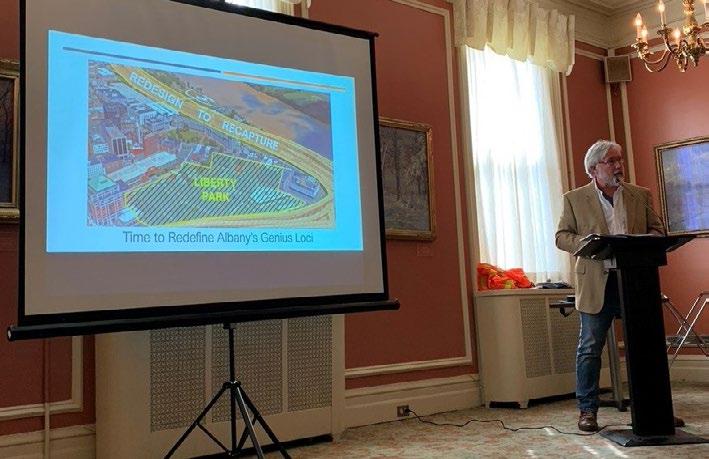
Albany Roundtable Talk | Reimagining the Waterfront
The Quandary
The analysis proved that, yes, rationally speaking, it probably will work. Though initially compelling, the analysis was quite rational, very left-brained, while 3t’s heart and soul, the firm’s reason for being, per se, was mostly driven by the right brain; intuitive, heartfelt. Going from it probably will work, to something that must be done, which I wanted to feel, was the widest gorge presented during the journey. What would blending the firms mean to us at 3t? Would it lead us to better opportunities, propel us forward, lead us down a path to better fulfill our mission or hold us back from doing so? Like any living, breathing relationship, it had to be fair and balanced with the ability to retain that
equilibrium in the long run. My premonition was it could, yet it was just that—a premonition. SWBR’s pursuit and creation of high-quality, impactful work was of paramount importance to them, that was never in doubt. It was evident in their work, and their Mission Statement - Positively Impacting lives through Meaningful Design. Essentially that is 3t’s mission, only using different words.
This helped a lot, but I was not yet convinced, and the dilemma remained.
The Origins
To understand 3tarchitects’ origins is to understand the depth of the dilemma. Because we are humanists, regionalists, and contextualists, the firm is deeply devoted to our community. We chose to stay local, go deep, to make meaningful, lasting impacts. Focusing on your community through the lens of caring is timeless, never trendy. Heartfelt, never insincere. Focusing our efforts on easing suffering by serving those who otherwise do not have a voice, while uplifting a community, came into focus early in my career, when I had the great fortune to work for Samuel Mockbee (pre–Rural Studio) and Coleman Coker, at Mockbee/Coker. To do so, 3t minimized overhead to be light on its feet, be progressive and open-minded, while still buying the best tools available for the sophisticated design staff to perform the services offered. This approach activated 3t’s underlying passions and beliefs. 3t’s accumulated impacts through the years exemplifies these beliefs and approach. The depth and level of care, not reach, is the firm’s strength. Therein lies the intrinsic value SWBR sought. Spreading us out (geographically) made me, and several of us, hesitant. Nonetheless, as mentioned earlier, Geoff and I were at a crossroads.
The Epiphany
If you have a euphoric desire that something must be done, do it; if not, do not, has always been my mantra. Positive premonitions existed but the yearning had yet to appear. Then it did. The undeniable and unforgettable euphoria and clarity sought appeared out of nowhere, catching me off guard. It occurred on a blustery, snowy day, while in the stands at my son’s volleyball tournament that, ironically, was in Rochester, SWBR’s home. Why then, why there? The answer seems so simple now. Tournaments provide a lot of down time, so I brought a book, my journal and SWBR’s Employee Handbook, which I had yet to read. The moment struck while reading the handbook. The language oozed kindness and caring for everyone that made up and contributed to SWBR’s community. If they carried such deep concern for one another’s well-being, they must care deeply for their clients and their communities. How could they not? This realization solidified when I considered how many folks worked at SWBR for such a long time and then how considerate, respectful, and egoless our on-going conversations had been with Tom Gears, SWBR’s CEO, and Mike Picard, their CFO. I realized then that SWBR was the community that 3t aspired to be. I wanted
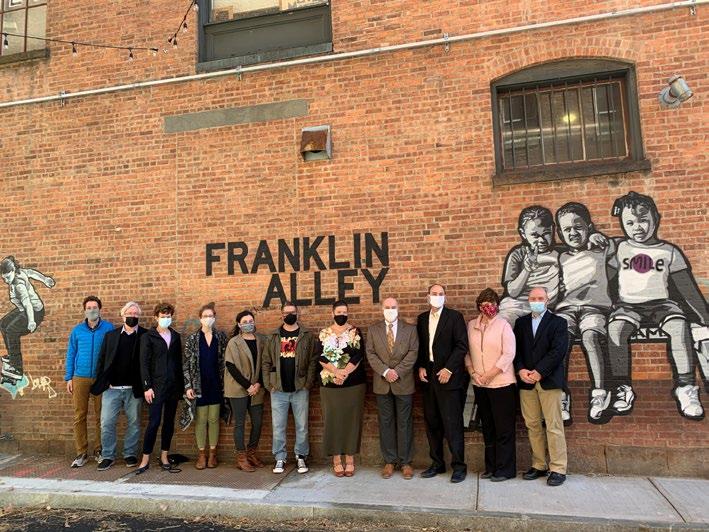
Ribbon Cutting on a Community Project, Created & Led by Scott
in for me, and all of us, knowing it was not only going to be OK, but it was also going to be bigger and better for all.
To me, the deal had to be done. Fortunately, Geoff agreed, and the deal was settled shortly thereafter.
David J. Beinetti AIA, LEED AP Chief Marketing Officer, SWBR
The Outcome
As separate entities, our outlook, aspirations, and missions paralleled one another, just at different scales and at opposites ends of Upstate New York. SWBR & 3t are now one entity. Together, and with even more depth, we are now able to serve and care for many more communities. The African Proverb, ‘if you want to go fast, go alone. If you want to go far, go together,’ is prominently displayed in our office. Previously, the term ‘together’ in the proverb referred to 3t personnel—10 or so. It still does refer to our personnel—now over 100.

